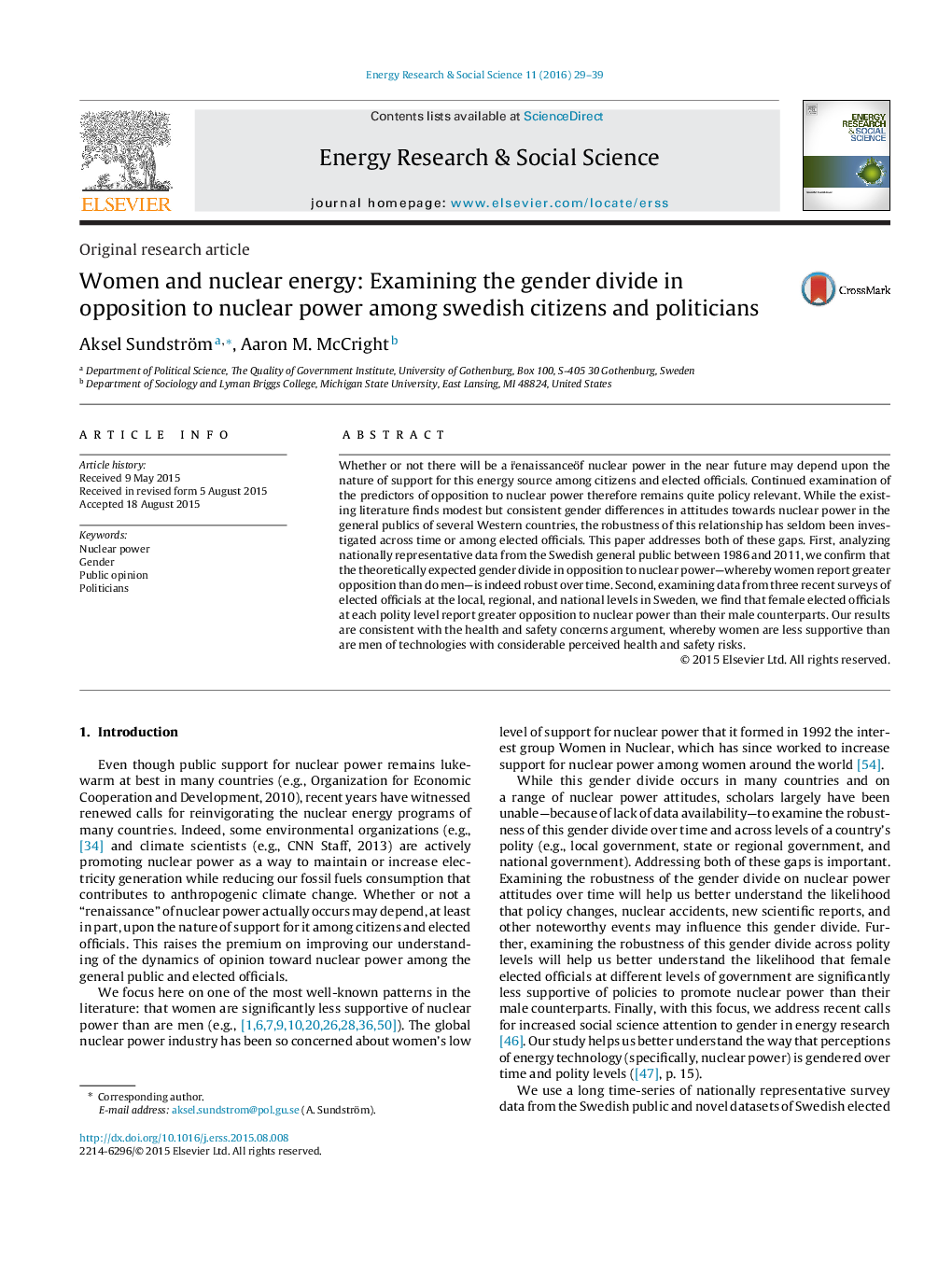| کد مقاله | کد نشریه | سال انتشار | مقاله انگلیسی | نسخه تمام متن |
|---|---|---|---|---|
| 6558365 | 161871 | 2016 | 11 صفحه PDF | دانلود رایگان |
عنوان انگلیسی مقاله ISI
Women and nuclear energy: Examining the gender divide in opposition to nuclear power among swedish citizens and politicians
ترجمه فارسی عنوان
زنان و انرژی هسته ای: بررسی تقسیم جنسیتی در مخالفت با قدرت هسته ای میان شهروندان و سیاستمداران سرخپوست
دانلود مقاله + سفارش ترجمه
دانلود مقاله ISI انگلیسی
رایگان برای ایرانیان
کلمات کلیدی
قدرت هسته ای، جنسیت، افکار عمومی، سیاستمداران،
ترجمه چکیده
این که آیا در آینده نزدیک "رنسانس" انرژی هسته ای وجود خواهد داشت یا نه ممکن است به ماهیت حمایت از این منبع انرژی در میان شهروندان و مقامات منتخب بستگی داشته باشد. نظرسنجی پیش بینی کننده مخالفت با قدرت هسته ای به همین ترتیب کاملا سیاست گذاری می شود. در حالی که ادبیات موجود تفاوت های جنسیتی شگرفی، اما متساوی در نگرش نسبت به قدرت هسته ای در عموم مردم چند کشور غربی پیدا می کند، پایداری این رابطه به ندرت در طول زمان و یا در میان مقامات منتخب مورد بررسی قرار گرفته است. این مقاله به این دو فاصله اشاره دارد. اولا، تجزیه و تحلیل داده های نماینده ملی از سوئد به طور کلی عمومی بین سال های 1986 و 2011، ما تایید می کنیم که تقسیم جنسیتی در مخالفت با قدرت هسته ای، انتظار می رود که زنان از مخالفت بیشتری نسبت به مردان برخوردارند - در حقیقت در حقیقت قوی است. دوم، بررسی داده ها از سه نظرسنجی اخیر مقامات منتخب در سطح محلی، منطقه ای و ملی در سوئد، ما دریافتیم که مقامات منتخب زن در هر سطح سیاسی، مخالفت بیشتری نسبت به قدرت هسته ای را نسبت به همتایان خود نشان می دهند. نتایج ما با استدلال نگران کننده سلامت و ایمنی مطابقت دارد، به این ترتیب، زنان کمتر از کسانی که از فن آوری هایی با خطرات احتمالی بهداشت و ایمنی درک شده استفاده می کنند کمتر حمایت می کنند.
موضوعات مرتبط
مهندسی و علوم پایه
مهندسی انرژی
انرژی (عمومی)
چکیده انگلیسی
Whether or not there will be a "renaissance" of nuclear power in the near future may depend upon the nature of support for this energy source among citizens and elected officials. Continued examination of the predictors of opposition to nuclear power therefore remains quite policy relevant. While the existing literature finds modest but consistent gender differences in attitudes towards nuclear power in the general publics of several Western countries, the robustness of this relationship has seldom been investigated across time or among elected officials. This paper addresses both of these gaps. First, analyzing nationally representative data from the Swedish general public between 1986 and 2011, we confirm that the theoretically expected gender divide in opposition to nuclear power-whereby women report greater opposition than do men-is indeed robust over time. Second, examining data from three recent surveys of elected officials at the local, regional, and national levels in Sweden, we find that female elected officials at each polity level report greater opposition to nuclear power than their male counterparts. Our results are consistent with the health and safety concerns argument, whereby women are less supportive than are men of technologies with considerable perceived health and safety risks.
ناشر
Database: Elsevier - ScienceDirect (ساینس دایرکت)
Journal: Energy Research & Social Science - Volume 11, January 2016, Pages 29-39
Journal: Energy Research & Social Science - Volume 11, January 2016, Pages 29-39
نویسندگان
Aksel Sundström, Aaron M. McCright,
